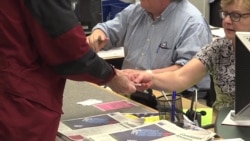On a rain-soaked weekday morning in Wisconsin’s capital, Madison, Molly McGrath is on a mission.
She’s the national campaign coordinator for Vote Riders, a nonprofit organization committed to ensuring people can vote, and on this morning, she’s giving Tammy Dotson a ride.
Their destination is the Department of Motor Vehicles, where Dotson needs to apply for an identification card, although she doesn't need it to drive.
“Someone called me on the phone and told me I needed a voter's ID to vote,” Dotson said.
Wisconsin’s primary on April 5 is the first election in the state in which residents will have to provide certain forms of identification to vote. The state's voter ID law, considered one of the strictest in the country, is in force at early polling locations in the state.
“I view it as a step backwards because people are being disenfranchised by the law," McGrath said. "We’re making more restrictive voting rights. We’re not enhancing them.”
Dotson said she believed the new law could drive potential voters away. “If they've got to go through a hassle, they'll be, like, 'Forget it, I’ll do it another time,' and it never happens,” she said.
Challenge refused
The U.S. Supreme Court refused to hear a challenge to Wisconsin’s voter ID law in 2015. Now, with early voting underway and the primary election on the horizon, McGrath’s organization is busy trying to remove obstacles for voters to get IDs. In addition to providing rides, the group is also trying to spread the word about the requirements.
“When you look at the numbers, 300,000 Wisconsin registered voters do not have an ID to vote," McGrath said.
A recent Marquette University Law School poll found that 16 percent of respondents either didn't know whether they needed identification to vote or thought they didn't need to provide it, "so there’s a lot of misinformation and a lot of people impacted by the law,” she added.
John Sharpless, a history professor at the University of Wisconsin-Madison and a former Republican congressional candidate, said concerns about widespread voter fraud, which helped bring about the law, were unfounded, as were concerns about voter disenfranchisement.
“It’s not an issue I find powerfully compelling,” he said. “The notion that some little old lady who has been voting since Reconstruction will not be able to vote, I think, is an exaggeration. Now there is the transition moment, and I think it’s going to be difficult.”
Dotson said that thanks to organizations like Vote Riders working in the state ahead of the election, however, there’s every reason to cast a ballot.
“You can get a ride to the DMV. You can get on the bus. You can get a cab for free. So there’s no excuse why you didn’t come and vote,” she said.






